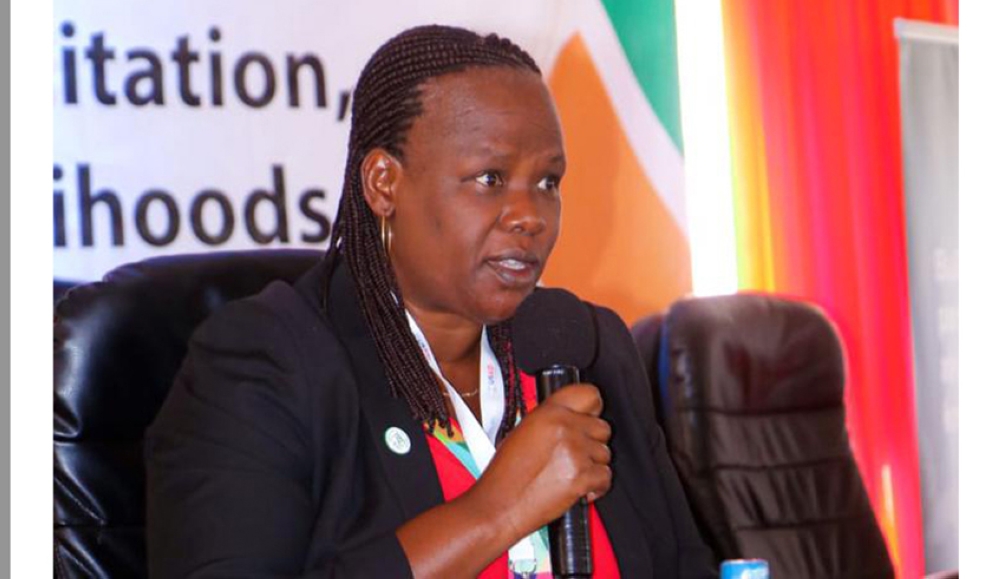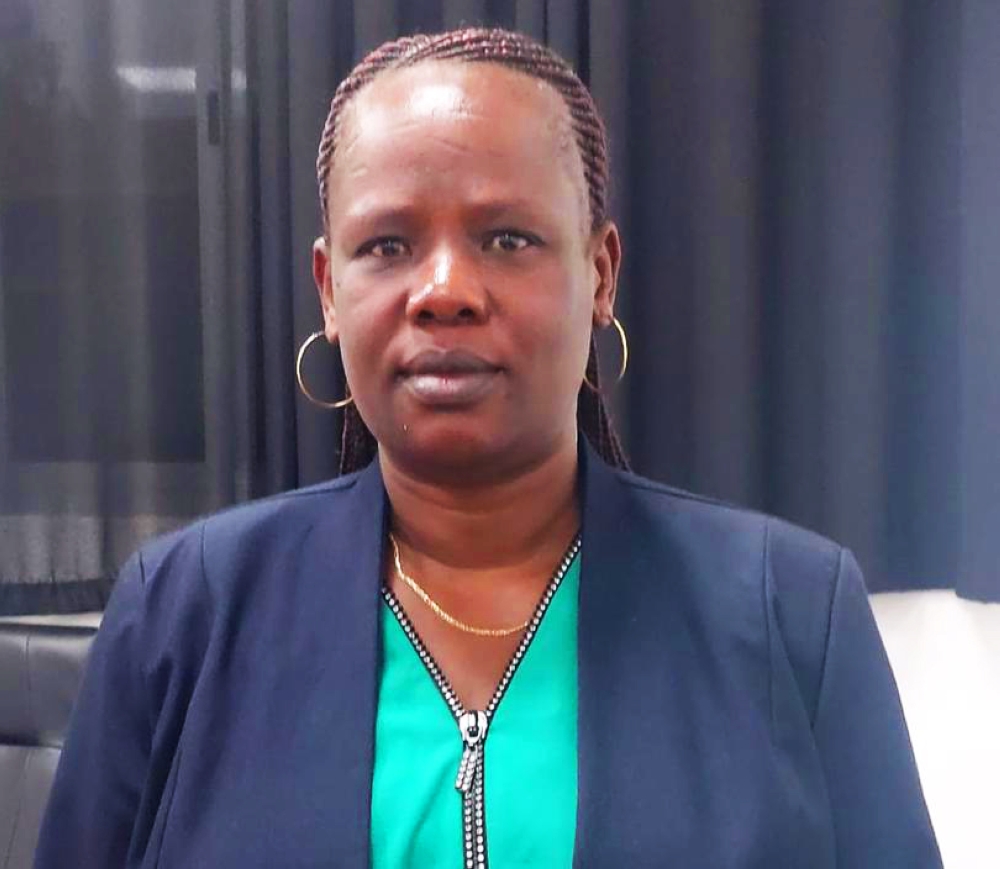

Growing up amidst the lush fields of her parents’ farm, Bellancile Uzayisenga developed a profound fascination with the intricate world of plants.
This early passion paved the way for her journey into the realm of science, where she discovered the power of research and innovation in ensuring global food security, and is now a plant pathologist dedicated to empowering girls in science and transforming Science, Technology, Engineering and Mathematics (STEM) education.
ALSO READ: STEM industry women inspire next generation of girls in tech
Uzayisenga is the Acting Plant and Microbial Biotechnology Programme Coordinator, and Senior Principal Research Fellow at Rwanda Agriculture and Animal Resources Development Board (RAB).
Her areas of expertise encompass plant pathology, entomology, microbiology, pesticide management, crop protection, microscopy, diagnostic protocol development, molecular biology, and bioinformatics. In simpler terms, she is a health expert with a focus on research and development to ensure healthy plants.
ALSO READ: Trailblazing and resilience: Celebrating women engineers’ role in Rwanda’s development
Empowering girls in science
Motivated by a profound conviction in the revolutionary possibilities of diversity and inclusivity, Uzayisenga has dedicated her life to encouraging girls to seek professions in STEM.


"Girls have so much aptitude and potential, and it was obvious that removing social barriers and establishing equal opportunities for them can have a significant impact. I aim to help them discover their potential and their ability to go even further in this field,” she said.
She went on to remark that valuing the ideas and contributions of women in science is essential to empowering them in the field. "If we eliminate the gender gap and achieve gender equality in the workplace, we can unleash the potential of future generations and create a more equitable and prosperous society for everyone.”
Uzayisenga’s dedication to fostering a love for science among young girls is evident in her initiatives and interactions. "I kept interacting with my daughter, nieces, and other girls about science,” she shared. "They used to help me with my field and lab work.”
Through these engagements, Uzayisenga, who holds a Ph.D. degree in Plant Pathology from the University of Nairobi, Kenya, and a Master of Science in Plant Pathology and Entomology from Wageningen University & Research in the Netherlands, has witnessed the transformative power of her efforts first-hand. "Eventually, my daughter became passionate about science. She is currently pursuing an undergraduate degree in civil engineering,” she stated.
Furthermore, Uzayisenga’s commitment extends beyond her immediate circle. "I used to provide symbolic awards to the best performers among female students of my neighbourhood. This was to encourage them to keep on in sciences studies,” she added.
Uzayisenga’s commitment to empowering girls in science extends to tangible initiatives aimed at fostering interest and skill development. "One of the initiatives I have implemented is organising interactive discussions and mentorship of girls in research activities,” she shared.
In her role as ambassador for the British Society for Plant Pathology (BSPP), Uzayisenga takes proactive steps to inspire and educate young minds. "I organise talks and workshops allowing participants, especially girls, to be inspired in plant pathology,” she explained. "They get hands-on experience using microscopes to examine diseased plants and conduct experiments on plant growth.”
Closing the gender gap in STEM
Uzayisenga shed light on the multifaceted factors contributing to the gender gap in STEM fields. "Several factors can contribute to the gender gap in STEM fields,” she asserted, "Lack of exposure to female role models and inspiration, inadequate career guidance from a lower age, lack of confidence, and lack of motivation can discourage girls from pursuing science studies.”
She emphasised the importance of addressing systemic inequalities. "Additionally, unequal access to resources and opportunities can limit their participation,” she noted. To combat these barriers, she advocates for proactive measures by introducing girls to science early on through engaging activities that highlight the achievements of amazing female scientists.
Uzayisenga underscored the pivotal role of educational institutions and parents in fostering an inclusive environment. "In classrooms, fostering a supportive environment where girls feel comfortable asking questions and taking risks is crucial,” she emphasised. "In addition, raising parents’ awareness of the potential of girls in sciences should be prioritised.”
PHOTOS: First Lady awards over 200 best-performing girls in Rwanda
A vision for the future
Uzayisenga paints a vivid picture of her vision for the future of women in science. "I envision a future where more women lead research teams, win Nobel prizes, and hold very high positions in scientific institutions,” she said.
Driven by a desire to inspire and empower, Uzayisenga aims to catalyse change by inspiring the next generation of female scientists and contributing to a more equitable scientific landscape.
Believing in the power of the six Cs - Confidence, Collaboration, Critical thinking, Communication, Creativity, and Continued advocacy, Uzayisenga is unwavering in her belief that this vision can be achieved.
"I believe that through these six Cs, we can make this vision of a brighter future for women in science a reality,” she explained, highlighting the transformative potential of collective action and commitment.
Uzayisenga urges all young females who have a passion for science and aspire to work in the field to be inquisitive, ask questions, and embrace experimentation.
Recognising the importance of mentorship and inspiration, Uzayisenga encourages girls to seek guidance. "Find role models who inspire you and consider seeking a mentor who can offer guidance and support,” she suggested, emphasising the value of learning from those who have walked the path before.
Acknowledging the challenges inherent in scientific pursuits, she offers words of encouragement. "Science can be challenging but do not be discouraged by setbacks. You can embrace them as opportunities to learn and grow and remember, you are not alone,” she said.
In fostering a sense of community and connection, Uzayisenga advocates for active participation. "Join a scientific club, participate, and connect with others online,” she added, highlighting the importance of collaboration and camaraderie in the pursuit of scientific endeavours.
Navigating work-life balance
Uzayisenga shed light on the challenges of maintaining work-life balance in the demanding realm of science. "My challenge has been navigating work-life balance,” she reflected.
"Science can be a demanding field, and it is easy to let personal needs fall by the wayside,” she added.
Through her journey, Uzayisenga has embraced the importance of setting boundaries and prioritising well-being. "Setting boundaries allows me to be more focused and productive when I am working, and ultimately benefits my overall success in science,” she said.


